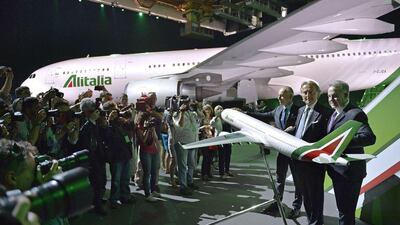“Pioneering” is a word that comes up often in the history of Etihad Airways. We have had to be pioneers from day one, forging a new path in what we do and how we do it, across all areas of our business. We have had to embrace innovation at the heart of our business and all our decision-making.
We came to the party late. Launching in 2003, Etihad’s vision was to develop as a global network carrier, offering a wide range of international connections through our hub at Abu Dhabi. In that way, we could deliver the scale of traffic that would also help stimulate the emirate’s tourism market.
The only problem with that vision was the head-start that everyone else had.
The European, American and Asian legacy carriers, as well as our Gulf competitors, had all had decades of investment in building fleets, networks, staffing, brands and infrastructure in less restrictive environments.
We did have three key advantages, however: a visionary shareholder willing to invest; our geographical position; and a blank sheet of paper.
Our shareholder, the Abu Dhabi government, was very clear – they had to be able to see a return on that investment. They were prepared to invest in success.
The second advantage was the geographical position of Abu Dhabi, a natural connecting point between the established markets of the west and the growing powerhouses of the east.
And the final advantage was our blank sheet of paper. We had to create everything from scratch – that meant no legacy aircraft, no legacy infrastructure, no legacy mindset.
This has been a powerful advantage.
It allowed us to establish a new way of dealing with our customers – not travellers, but guests.
It allowed us to establish a new workforce that is not bound by the structures of decades of ‘seniority’. At Etihad, we’ve been able to create a meritocracy, one in which more than 3,000 Emiratis are now building their careers.
And it allowed us to develop new ways of working with partners. We knew we couldn’t go it alone – not if we were to have the feed necessary for a network carrier. So we embraced partnerships with many other airlines, in the form of code-shares.
We also sought long-term relationships with key partners – from aircraft manufacturers, to engine-makers, to financial institutions, to technology and in-flight entertainment suppliers – so that we could work together to create innovative new business models to serve our guests better, and deliver better returns.
Then we went further, with minority investments in airlines in key strategic markets. These investments were made with three goals in mind.
Firstly, they would deliver that access to markets and feed traffic into our hub.
Second, we could work on joint procurement and other business synergies which would save us – and our partners - hundreds of millions of dollars.
Third, we believed that our capital investment could allow the management of these airlines to reshape their businesses into sustainably profitable operations.
Of course, their business strategies remained in the hands of the local management in each case. We are pleased to support management, and to advise where requested, but the plans and implementation are in their hands.
In the first two areas, we have seen strong results: hundreds of millions of dollars a year in additional revenues, and hundreds of millions of dollars of synergies, for Etihad and for the partners. Last year alone, our code-share and partner strategy connected 5.5 million guests onto our flights.
In the third area, some of those airlines have faced greater challenges in adjusting their own strategies than we expected.
Airberlin has now addressed these challenges, with a radical restructure which started by looking at a ‘blank sheet of paper’ – what would be the best possible model to be created from the resources the company had? The result is a new, focused long haul airline, a separate leisure business and an agreement to lease 40 aircraft to Lufthansa.
In parallel, Etihad has developed a wider set of business relationships in Germany, through exciting new partnerships with Lufthansa and TUI.
Now Alitalia is also reviewing its business strategy. It will deliver significant change, with a core goal of developing a truly sustainable business.
In any business, you need to set a strategy and then be ready to react to market pressures and external challenges. We are committed to our equity partner strategy – it delivers a huge amount to our business. Some of those airlines need to react to the market pressures they face, and we are supportive of that process too.
Our approach has helped us grow from a $300 million a year airline, to a diversified aviation group which delivers revenues of more than $26 billion. No other airline in history has achieved so much in 11 years.
That evolution has not happened by accident. Etihad Aviation Group is now a solid, diversified business with strength in depth – and with the scale to shape its destiny in the future.
As we face the challenges of the year ahead, the group can feel confident it is positioned strongly to build on those foundations.
The writer is the president and chief executive of Etihad Aviation Group.
business@thenational.ae
Follow The National's Business section on Twitter

